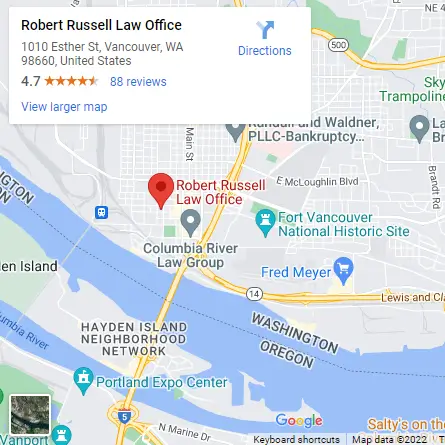Vacate (Expunge) Your Criminal Record
In many instances, individuals in Washington who have been convicted of a crime have the option and capacity to have that conviction reversed and the case dismissed. The process of vacating a conviction is essentially moving the court to allow the withdrawal of a previous guilty plea or setting aside a jury or judge verdict of guilt, reinstating the plea of not guilty and then, dismissing the case. Since the effect of vacating a conviction is retroactive, it would be as if the conviction never occurred, allowing the person benefiting from the order to lawfully claim that he or she had never been convicted of that crime.
Once a criminal conviction has been successfully vacated, many clients wish to explore the possibility of sealing the entire case record. While vacating the guilty plea puts the individual in the same position they were prior to the conviction, evidence of the existence of the proceedings will still exist in multiple public and private databases.
We will review your record with you and help devise an efficient and effective plan to vacate your record of conviction and a plan to eventually attempt to have those records sealed. If vacating or sealing your records is not an option, we will look into other alternatives.
There are two different statutes that apply to the vacating of convictions; one for felonies and another for misdemeanors and gross misdemeanors.
Vacating a Felony Conviction, or Multiple Felony Convictions
Enacted in 1985, RCW 9.94A.640 provides the guidelines by which a person convicted of certain felonies can have their record of conviction vacated. This statute applies to all crimes that were committed from 1985 and on. To qualify for vacating a record of felony conviction:
- The offense must not be an excluded offense.
- The offender must have been discharged pursuant to RCW 9.94A.637. This means that the individual has completed all terms of probation, including any financial liabilities imposed by the court AND that a certificate of discharge has been filed with the sentencing court.
- For Class B felonies, ten (10) years must have elapsed since the date of discharge.
- For Class C felonies, five (5) years must have elapsed since the date of discharge.
- No new criminal charges are pending.
- There have been no new convictions in the interim.
Felonies Prior to 1985
The current felony conviction vacation statute was not enacted until 1985. That means that officially, it only applies to crimes and criminal convictions that occurred after that date. It is our experience, however, that courts will use the same guidelines contained within RCW 9.94A.640 when determining whether or not to vacate a felony that occurred prior to 1985.
Vacating a Misdemeanor Conviction
As with adult felony convictions, the state of Washington provides for the vacation of certain misdemeanors and gross misdemeanors under specific conditions as well. RCW 9.96.060, like its felony counterpart, authorizes the sentencing court, at its discretion, to allow the defendant to withdraw his guilty plea and enter a plea of not guilty OR to set aside a guilty verdict and then to dismiss the case, vacating the judgment and sentence. To qualify under this statute:
- No new criminal charges can be pending at the time of the request.
- No new convictions exist since the date of the conviction to be vacated.
- No previous charges have been vacated at the request of the applicant.
- The offense can not be a violent offense pursuant to RCW 9.94A.030.
- The conviction can not be for DUI (RCW 46.61.502) or Physical Control (RCW 46.61.504).
- The offense can not be a sex offense under RCW Chapters 9.68, 9.68A or 9A.44.
- Three years must have elapsed since the fulfillment of all court conditions.
- Five years have elapsed since the fulfillment of conditions in a domestic violence related case AND the applicant has provided notice to the prosecuting attorney, there are no previous domestic violence convictions, and the applicant signs and affidavit declaring there are no previous DV related convictions and a background check substantiates this.
- The applicant is not currently restrained, nor has been restrained within 5 years of the application, from contact with another party.
There are more caveats and conditions present in the misdemeanor vacation statute than exists in the felony statute. But essentially, so long as the charge is not a DUI, Physical Control, violent offense or sex offense, a person can be eligible for vacating the record of conviction.
What Happens Next
Once the order vacating the conviction has been granted, the clerk of the court, “shall immediately transmit the order vacating the conviction to the Washington State Patrol Identification Section and to the local police agency, if any, which holds criminal history information for the person who is the subject of the conviction.” RCW 9.92.066, 9.95.240, 9.96.060. Interestingly, the felony vacation statute, RCW 9.94A.640, does not include this language. Nevertheless, Washington courts follow this same practice for vacated felonies as well. These statutes further go on to say that the, “state patrol and any such local police agency shall immediately update their records to reflect the vacation of the conviction, and shall transmit the order vacating the conviction to the Federal Bureau of Investigation (FBI).”
Finally, convictions that have been vacated under these section may not be disclosed by, “the state patrol or local law enforcement agency to any person, except other criminal justice enforcement agencies.” This means that after the record of conviction has been vacated, the only parties eligible to review the vacated records are actual law enforcement agencies. The problem, however, is that despite the demands of the statute on the state patrol, this statute does nothing to remove the fact of the criminal proceeding from the public record or to remove the information from private data bases. Additional steps will need to be taken to attempt to ensure this.
To schedule a free no obligation consultation, contact us.



